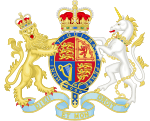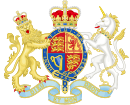- Crown Prosecution Service
-
Crown Prosecution Service (Welsh: Gwasanaeth Erlyn y Goron) 
Non-ministerial government department overview Formed 1986 Jurisdiction England and Wales Headquarters Rose Court, 2 Southwark Bridge, London, SE1 9HS Employees 8,562 Annual budget £672.5 million (2009–2010) [1] Minister responsible Dominic Grieve, Attorney General Non-ministerial government department executive Keir Starmer QC, Director of Public Prosecutions Website www.cps.gov.uk This article is part of the series: Courts of England and Wales Law of England and Wales  Administration
Administration- Ministry of Justice
- Her Majesty's Courts and Tribunals Service
- Judges' Council
Criminal courtsCriminal prosecution- Attorney General
- Director of Public Prosecutions
- Crown Prosecution Service
Legal professionThe Crown Prosecution Service, or CPS, is a non-ministerial department of the Government of the United Kingdom responsible for public prosecutions of people charged with criminal offences in England and Wales. Its role is similar to that of the longer-established Crown Office in Scotland, and the Public Prosecution Service in Northern Ireland. The CPS is headed by the Director of Public Prosecutions (currently Keir Starmer QC) who answers to the Attorney General for England and Wales (currently Dominic Grieve, QC, MP).
The Crown Prosecution Service is responsible for criminal cases beyond the investigation, which is the role of the police. This involves giving advice to the police on charges to bring, being responsible for authorising all but a very few simple charges (such as begging), and preparing and presenting cases for court, both in magistrates' courts and, increasingly, the Crown Court.
Contents
History
Historically, in England, with no police forces and no prosecution service, the only route to prosecution was through private prosecutions brought by victims at their own expense or lawyers acting on their behalf. From 1829 onwards, as the police forces began to form, they began to take on the burden of bringing prosecutions against suspected criminals.
In 1880, Sir John Maule was appointed to be the first Director of Public Prosecutions, operating as a part of the Home Office; the jurisdiction was only for the decision as to whether to prosecute, and just for a very small number of difficult or important cases; once prosecution had been authorised, the matter was turned over to the Treasury Solicitor. Police forces continued to be responsible for the bulk of cases, sometimes referring difficult ones to the Director. In 1884, the offices of the DPP and the Treasury Solicitor were merged, but were again separated by the Prosecution of Offences Act 1908.
In 1962, a Royal Commission recommended that police forces set up independent prosecution departments so as to avoid having the same officers investigate and prosecute cases though, technically, the prosecuting police officers did so as private citizens.
However, the Royal Commission's recommendation was not implemented by all police forces, and so in 1978 another Royal Commission was set up, this time headed by Sir Cyril Philips. It reported in 1981, recommending that a single unified Crown Prosecution Service with responsibility for all public prosecutions in England and Wales be set up. A White Paper was released in 1983, becoming the Prosecution of Offences Act 1985, which established the CPS under the direction of the Director of Public Prosecutions, consisting of a merger of his old department with the existing police prosecution departments. It started operating in 1986.
The power of the police to charge for all but the most minor offences was transferred to the CPS following the Criminal Justice Act 2003.
Organisational structure
The CPS is divided into 13 geographical Areas across England and Wales. Each Area is led by a Chief Crown Prosecutor (CCP) who is responsible for the provision of a high quality prosecution service in their Area. Each CCP is supported by an Area Business Manager (ABM), and their respective roles mirror, at a local level, the responsibilities of the DPP and Chief Executive. Administrative support to Areas is provided by Area Operations Centres. A 'virtual' 14th Area, CPS Direct, is also headed by a CCP and provides out-of-hours charging decisions to the police.
Each area is headed by a Chief Crown Prosecutor who reports directly to the Director of Public Prosecutions. In London, the Chief Crown Prosecutor is supported by Sector Directors. Although Chief Crown Prosecutors are directly accountable for the prosecutions in each area, most of the responsibility for the business administration of the area is overseen by an Area Business Manager.
The CPS is the largest employer of lawyers in the UK, dealing exclusively with criminal prosecutions. At the end of March 2006, it employed a total of 8,775 people; almost a third of which were qualified prosecutors.[2] They deal with more than 1.3 million cases annually in the Magistrates' court and approximately 115,000 in the Crown Court. Other staff include Associate Prosecutors, who are not qualified lawyers but are specially trained to review and present limited range of cases in magistrates' courts, paralegal staff who carry out work required to implement decisions and progress existing cases, and administrative staff who deal with tasks such as tracking the progress of cases, liaising with other agencies, matching incoming material to case files and copying and sending out documents.
The headquarters in South-East London sets national business strategies; develops and delivers policies, practices and procedures for the prosecution process; delivers IT and other services; deal with issues such as equality and diversity issues for the organisation and provides administrative support to areas.
Complementing the bulk of qualified lawyers prosecuting in-area, the Crown Prosecution Service also has the following two specialist casework groups:
- Central Fraud Group based in London, Manchester in York, concentrating on the country's most serious and complex cases of fraud and associated dishonesty offences
- Serious Crime Group which is further divided into two divisions
- Organised Crime
- Special Crime & Counter Terrorism
On 2 March 2004 the Director of Public Prosecutions commented on a rumoured re-naming of the service to the 'Public Prosecution Service':
"We are a public prosecution service and for some time I have favoured a change of name to make that clearer. This would reflect the major transformation that we are making in the role of prosecutors within the criminal justice system. I have discussed this with the Attorney General who takes the same view and I am discussing it with my staff. No final conclusion has yet been reached. When this process is complete the Attorney General and I will announce our decision.”
— Ken Macdonald QC[3]
Some suggest that such a change would undermine the constitutional role of the department, nominally at least. It is unclear whether a name change is imminent, or is still being discussed at all. This proposed change was very unpopular within the Service as being pointless and otiose, as well as somehow insulting.[citation needed]
Role
In 2009, the Director of Public Prosecutions Keir Starmer QC announced the introduction of the Core Quality Standards,[4] a set of twelve standards which outline what the service does, how decisions are made, and the service that the public can expect. It is akin to The Policing Pledge.
Decision to prosecute
The Code for Crown Prosecutors[5] sets out the basis upon which prosecutions are refused, discontinued or proceeded with. A case will only be prosecuted firstly, if there is sufficient evidence to provide a realistic prospect of conviction against each defendant on each charge, and secondly, if it is in the public interest to prosecute.
The Crown Prosecution Service must first decide, after evidence is gathered by the police, whether there is sufficient evidence for the case to be prosecuted (by way of summons to court or criminal charge). Officers provide the prosecutor with the evidence gathered and although there may be a decision not to charge at that stage, the prosecutor will assist the officer by explaining what additional work or evidence could raise the case to the required standard. If further evidence is not available, no further action may be taken against the suspect.
If there is sufficient evidence to prosecute, Crown Prosecutors must still decide whether a prosecution would be in the public interest. Paragraph 4.12 of The Code for Crown Prosecutors states: "A prosecution will usually take place unless the prosecutor is sure that there are public interest factors tending against prosecution which outweigh those tending in favour, or unless the prosecutor is satisfied that the public interest may be properly served, in the first instance, by offering the offender the opportunity to have the matter dealt with by an out-of-court disposal. The more serious the offence or the record of criminal behaviour, the more likely it is that a prosecution will be required in the public interest." Examples of public interest factors that may be taken into account include the likelihood of the court imposing a nominal penalty or if the offence was the result of a mistake or misunderstanding.[6]
The CPS will only start or continue a prosecution if a case has passed both tests
Pre-charge advice and charging decisions given by prosecutors in this way takes place at police stations, local CPS offices, or over the telephone.
Charging decisions involve the prosecutor applying his or her knowledge of the law to the facts before them; in some cases there may be more than one criminal offence that applies to the circumstances of the case. In order to achieve consistency in the decision-making process, prosecutors refer to Charging Standards for offences, agreed between the CPS and Police. In addition, they may refer to current CPS policy and guidance on the prosecution of certain types of offences, such as domestic violence and hate crime.
On 20 December 2004, following a public consultation exercise, the Attorney General published a report "Pre-Trial Witness Interviews by Prosecutors". The report concluded that prosecutors should be permitted to speak to witnesses, including children and vulnerable witnesses, about matters of evidence. A similar practice is already carried out in Scotland (where it is called precognition), Canada, and the United States. In November 2005, the Director of Public Prosecutions reported that a pilot scheme was being introduced where the CPS would be allowed to interview witnesses before taking a case to trial.[7] The pilot scheme took place in Cumbria, Lancashire, Merseyside and Greater Manchester between January 2006 and February 2007. An assessment of the scheme concluded that it brought benefits to the prosecuting process and helped to strengthen cases to be brought to trial and also identify those that should be discontinued on evidential grounds. National rollout of the scheme took place in April 2008[citation needed] and is supported by a Code of Practice,[8] issued by the Director of Public Prosecutions, which provides guidance to prosecutors conducting pre-trial interviews with witnesses.
List of Directors of Public Prosecutions since 1986
- Sir Thomas Hetherington, QC (1986–1987) (had been DPP since 1977)
- Sir Allan Green, QC (1987–1992)
- Dame Barbara Mills, DBE, QC (1992–1998)
- Sir David Calvert-Smith, QC (1998–2003)
- Sir Ken Macdonald, QC (2003–2008)
- Keir Starmer, QC (2008–)
See also
References
- ^ Crown Prosecution Service Annual Report 2009-2010, Crown Prosecution Service, http://www.cps.gov.uk/publications/reports/2009/financial_review.html, retrieved 2010-12-18
- ^ "facts about the CPS". Crown Prosecution Service. http://www.cps.gov.uk/about/facts.html. Retrieved 2010-09-20.
- ^ "Statement on CPS change of name" (Press release). Crown Prosecution Service. 2004-03-02. http://www.cps.gov.uk/news/press_releases/109_04/. Retrieved 2010-09-20.
- ^ "Core Quality Standards". Crown Prosecution Service. http://www.cps.gov.uk/publications/core_quality_standards/. Retrieved 2010-09-20.
- ^ The Code for Crown Proescutors, July 2010 http://www.cps.gov.uk/publications/docs/code2010english.pdf
- ^ Ibid.
- ^ Dyer, Clare (2005-11-11). "Criminal justice revolution to secure more convictions". The Guardian. http://www.guardian.co.uk/uk/2005/nov/11/ukcrime.prisonsandprobation1. Retrieved 2010-09-20.
- ^ "Pre-trial witness interviews: Code of practice". Crown Prosecution Service. February 2008. http://www.cps.gov.uk/victims_witnesses/resources/interviews.html. Retrieved 2010-09-20.
External links
Categories:- Non-ministerial departments of the United Kingdom Government
- Government agencies established in 1985
- 1986 establishments in the United Kingdom
- Legal organisations in England and Wales
- Prosecution
- Prosecution services of the United Kingdom
Wikimedia Foundation. 2010.

